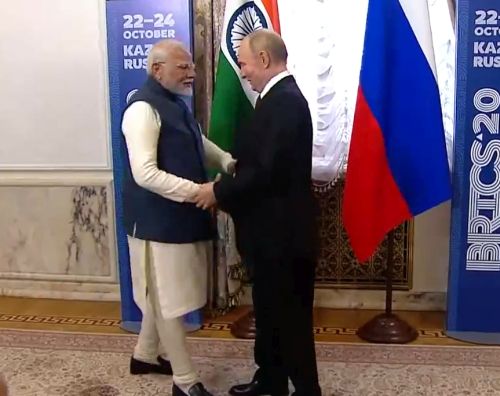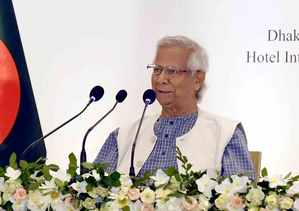International
Cross-border terrorism requires decisive response: PM Modi's strong message to SCO
Astana, July 4 (IANS) Reminding the Shanghai Cooperation Organisation (SCO) of one of its “original goals”, Prime Minister Narendra Modi on Thursday stated that cross-border terrorism requires a “decisive response” from the grouping which must “naturally” give priority to combating terrorism and respecting territorial integrity in the region.
PM Modi’s remarks, delivered by External Affairs Minister S. Jaishankar at the 24th meeting of the SCO Council of Heads of State in Kazakhstan’s Astana, assume significance as the gathering of leaders physically attending the summit also included Pakistan Prime Minister Shehbaz Sharif and Chinese President Xi Jinping.
“Many of us have had our experiences, often originating beyond our borders. Let us be clear that if left unchecked, it can become a major threat to regional and global peace. Terrorism in any form or manifestation cannot be justified or condoned,” EAM Jaishankar, who is leading the Indian delegation at the Summit, mentioned while delivering PM Modi’s remarks.
“International community must isolate and expose those countries that harbour terrorists, provide safe havens and condone terrorism. Cross-border terrorism requires a decisive response and terrorism financing and recruitment must be resolutely countered,” PM Modi added in his message to the SCO community which represents approximately 40 per cent of the world’s population and nearly one-third of the global economy.
Prime Minister Modi also urged to take “proactive steps” to prevent the spread of radicalisation among the youth while highlighting the shared commitment agreed upon by the member states in the Joint Statement issued during India’s SCO Presidency last year.
He said that the meeting was taking place in the backdrop of pandemic impact, ongoing conflicts, rising tensions, trust deficits and increasing number of hotspots around the world – events which have put significant strain on international relations and global economic growth.
“At this time, it is particularly noteworthy that we are reiterating mutual respect for sovereignty, independence, territorial integrity, equality, mutual benefit, non-interference in internal affairs, non-use of force or threat of use of force as a basis for our foreign policies. We have also agreed not to take any measures contrary to the principles of state sovereignty and territorial integrity,” PM Modi underlined in his remarks.
The gathering of the leaders, he said, is aimed at finding common ground to mitigate the consequences of these developments.
While congratulating Iran and Belarus, the new members of the organisation, PM Modi said that the SCO occupies a prominent place in India’s foreign policy.
Prime Minister Modi, in his remarks, also focused on working towards achieving committed reduction in emissions and having robust connectivity for economic development.
“Respect for sovereignty and territorial integrity is essential for connectivity and infrastructure projects. So too are non-discriminatory trade rights and transit regimes. The SCO needs to deliberate seriously on these aspects,” he stated.
He also spotlighted India’s commitment to ‘AI for All’ while insisting that the 21st century is the century of technology.
“We have to make technology creative and apply it to the welfare and progress of our societies. India is among the countries to formulate a National Strategy on Artificial Intelligence and the launch of an AI Mission,” PM’s remarks mentioned.
India’s priorities at the SCO Summit have been shaped by PM Modi’s vision of SECURE, which stands for Security, Economic development, Connectivity, Unity, Respect for sovereignty and territorial integrity, and Environmental protection.
The principle of SECURE reflected the theme of India’s first-ever presidency of SCO, as was asserted by PM Modi during the virtual SCO Summit hosted by New Delhi on July 4, last year.
–IANS
as/svn
International
Lee Hsien Yang seeks refuge in United Kingdom

Lee Hsien Yang, the youngest son of Singapore’s founding father, the late Lee Kuan Yew, announced on Tuesday that he is now a political refugee in the United Kingdom after seeking asylum from the British government “as a last resort.”
“I remain a Singapore citizen and hope that someday it will be safe to return home,” Lee stated in a Facebook post, as reported by Channel News Asia (CNA).
Citing what he described as the Singapore government’s “attacks” against him, Lee, who is the younger brother of former Prime Minister Lee Hsien Loong, revealed that he sought asylum protection in 2022.
Lee Hsien Yang and his late sister, Lee Wei Ling, who passed away earlier this month, have been in conflict with their brother Lee Hsien Loong over the fate of their father’s home following his death in 2015, resulting in a public dispute that has estranged the siblings.
In an interview with the UK-based newspaper The Guardian, Lee alleged that a “campaign of persecution” compelled him to seek asylum in Britain.
In response to his claims, the Singapore government stated that there is “no basis” for his allegations of “a campaign of persecution” or other assertions regarding political repression in the country.
“Singapore’s judiciary is impartial and makes decisions independently. This is why Singaporeans have a high level of trust in the judiciary,” a government spokesperson remarked.
The spokesperson added that there are no legal restrictions preventing Lee and his wife, lawyer Lee Suet Fern, from returning to Singapore. “They are and have always been free to return to Singapore,” the spokesperson said.
Lee and his wife have been outside of Singapore since 2022, having opted not to attend a scheduled police interview regarding potential offenses related to providing false evidence in judicial proceedings concerning their father’s will and the family home.
Lee and his late sister, who had been living at the property, alleged they felt threatened while trying to fulfill their father’s wish to demolish the house. They also accused their elder brother, former Prime Minister Lee Hsien Loong, of abusing his governmental influence to advance his personal agenda.
International
Indo-Russian ties are stronger than ever before at BRICS

Kazan, Russia: Prime Minister Narendra Modi held a bilateral meeting with Russian President Vladimir Putin on the sidelines of the 16th BRICS Summit.
During the meeting, President Putin remarked, “I recall our meeting in July, where we had productive discussions on various issues. We’ve also spoken over the phone several times. I am very grateful you accepted the invitation to come to Kazan. Today, we will attend the BRICS Summit’s opening ceremony, followed by dinner.”
PM Modi responded by expressing his appreciation, saying, “I sincerely thank you for your friendship, warm welcome, and hospitality. It’s a great pleasure to visit such a beautiful city as Kazan for the BRICS Summit. India shares deep historical ties with this city, and the opening of our new embassy here will further strengthen these connections.”
International
Laos seeks to enhance nutrition amid climate change concerns

Vientiane (Laos), Aug 22 (IANS) Representatives from the Lao government and development partners have attended a conference here titled “Climate Change and Nutrition in Laos: Intersections and Interventions” to discuss the impact of climate change on nutrition in the Southeast Asia country and potential solutions.
Speaking at the conference, deputy director general of the Department of Hygiene and Health Promotion under the Lao Ministry of Health Viengkhan Phixay, said, “We gather to address a critical and interwoven issue: the impact of climate change on nutrition and how we can work together to tackle these challenges,” Xinhua news agency reported.
The Lao government is actively engaged in this endeavor, with numerous policies and initiatives aimed at addressing both climate change and nutrition, Lao National Television reported on Thursday.
“By leveraging the Scaling Up Nutrition network in Laos, which is led by the government, and supported by civil society, donors, and the United Nations, we have a robust platform to tackle the negative impacts of climate change while improving nutrition and overall health for everyone in Laos,” Viengkham said at the conference held on Monday.
The conference featured a series of presentations that not only detailed evidence-based research but also introduced innovative tools for measuring and enhancing nutrition under the impact of climate change.
The conference stressed the critical need for integrated approaches to tackle the intertwined challenges of climate change and nutrition, and setting the stage for impactful future collaborations.
–IANS
int/psd
International
One killed, seven injured in shootout in Iraq

Baghdad, Aug 22 (IANS) A civilian was killed while seven others were injured on Thursday in a tribal shootout in Iraq’s holy Shiite province of Najaf, according to a local security source.
The shootout erupted in the early hours between armed men from the local tribe in the al-Zarga area in northern Najaf, some 160 km south of Baghdad, a local police officer told Xinhua on condition of anonymity.
The clash resulted in the killing of an Iraqi civilian and the injury of seven others, including three Iranian Shiite pilgrims, the source added.
A joint force from the Interior Ministry’s emergency response division and Najaf provincial police arrested 53 gunmen from both sides of the shootout and seized weapons and ammunition, the Interior Ministry said in a statement.
It added that search operations are ongoing to locate additional gunmen and weapons, with more details to be released later.
The incident took place as numerous pilgrims traveled to the city of Karbala to observe Arbaeen, which marks the end of a 40-day mourning period for the killing of Imam Hussein, the grandson of Prophet Muhammad, in the Battle of Karbala in 680 A.D.
Typically, these pilgrims also visit Najaf as part of their journey to Karbala.
–IANS
int/jk/arm
International
Bangladesh seeks $1 billion budget support from World Bank

Dhaka, Aug 22 (IANS) Bangladesh’s interim government has sought $1 billion from the World Bank as budgetary support.
The call came from the country’s Power, Energy and Mineral Resources Adviser Muhammad Fouzul Kabir Khan’s meeting with Abdoulaye Seck, the World Bank’s Country Director for Bangladesh and Bhutan, in Dhaka on Wednesday.
He made the plea as the ministry owes more than 2 billion dollars to suppliers in import costs of power and energy, Xinhua news agency reported.
Khan mentioned that the interim government, which was formed with many pressing mandates, is due to settle a $2 billion debt left by the previous government in the power sector.
He said they have already suspended activities under the much-criticized Quick Enhancement of Electricity and Energy Supply Act 2010 and abolished the government’s power to set energy prices without any public hearing.
On August 5, the former Prime Minister of Bangladesh, Sheikh Hasina, was ousted from her country and power, ending her rule since January 2009.
This event was seen as a massive escalation, with what initially started as student’s protests and resulted in a major crisis in Bangladesh.
Earlier on August 8, Nobel laureate Muhammad Yunus took oath as the head of Bangladesh’s interim government.
–IANS
int/jk/as
-
Video2 years ago
PM Modi Attacks Congress in Karnataka with “Kerala Story”
-
Politics2 years ago
Siddaramaiah & DK Shivakumar sworn in as Chief Minister & Deputy CM respectively
-
Cricket2 years ago
CSK players rejoice 5th IPL title with their families (Pics)
-
Entertainment2 years ago
Karan Deol weds his longtime Girlfriend Drisha Acharya (Pics)
-
Sports7 years ago
History Of Official FIFA WORLD CUP Match balls
-
India2 years ago
Ashwini Vaishnaw: Railway Board recommends CBI probe in the Odisha railway disaster
-
Entertainment2 years ago
Urvashi Rautela dazzles on Cannes 2023 red carpet (Pics)
-
Entertainment2 years ago
Sunny Leone gets ready for Kennedy premiere in Cannes (Pics)






























